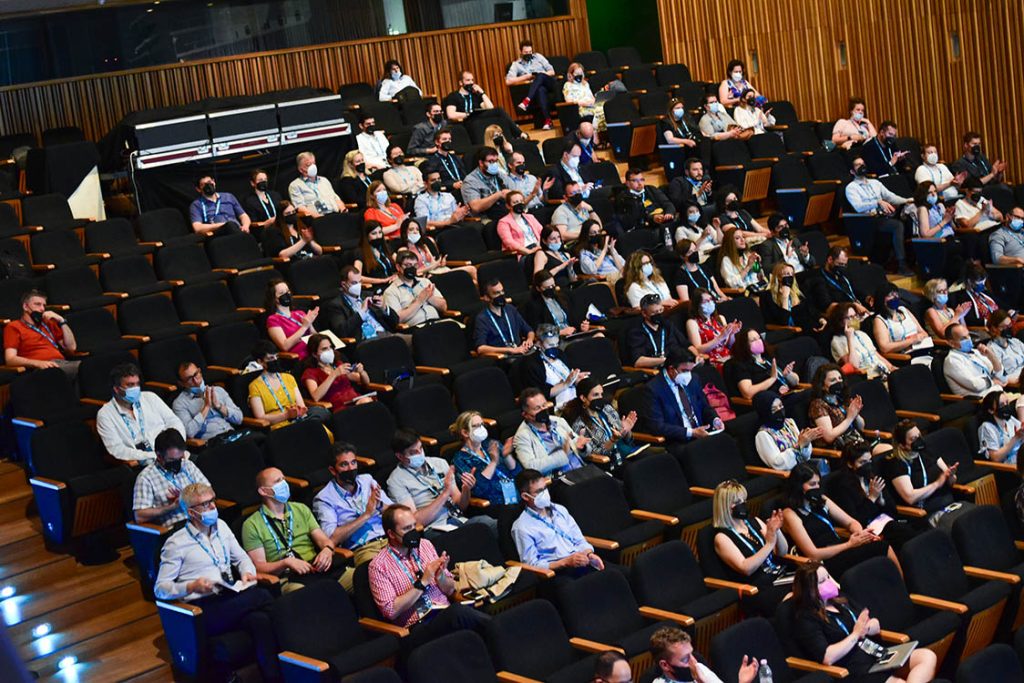31 May 2022
The ESC-tension project presented around Europe
May has been a very busy month for the ESC-tension project and for the next steps to be taken in the field of student identification and related student services provision, with a focus on Erasmus+ students. As a matter of fact, the ESC-tension staff of the institution was involved in two different international events taking place simultaneously from 17 to 19 May.
The first one to mention is the ECCA Annual Conference that took place in Porto where the ESC-tension partnership were represented by Silvia Faloretti who shared the latest project results and the tools being developed during this final project phase.
After contextualizing the project in the background it originates from, the European Education Area - one of the most ambitious goals set by the European Commission by 2025 – Faloretti provided the audience with some main information about the project and its outputs. The focus was indeed on the main deliverables, both the already implemented ones – such as the ESC-tension main platform, its national versions and the Profiling Tools - and on those currently being validated and almost ready for the finetuning phase, specifically the Card and the Services Toolboxes. The audience was invited to join this validation phase: representing indeed the target groups of the main stakeholders in Higher Education Institutions, Student Service Providers and student associations, they were able to provide relevant feedback and inputs.
The attendees were also invited to join the final Multiplier Events of the project, namely the “ESC-tension weeks”, taking place at the end of October – where the results achieved will be shared with the stakeholders.
The ECCA conference was a great networking opportunity for the ESC-tension partnership to spread the word about the project, and to start new business relationships with the actors of the HE-sector present there. Indeed, the conference saw the presence of around 150 attendees from 33 different entities from within and outside Europe, and on the sponsorship of big players such as Google and ELATEC, that joined the conference sharing their valuable points of view.
At the same time, another major event within the European panorama of the student digitalisation initiatives was taking place in in Thessaloniki, namely the EDSSI Final Conference, where ENDISU participated in its role of core partner involved in first place in the conference organisation. The event was hosted by Aristotle University in Thessaloniki, leader of the project. The conference saw a great participation, with most people coming from Higher Education Institutions across Europe and relevant stakeholders in the Erasmus+ network. It was a great opportunity to explore more in depth the EDSSI interoperable infrastructure, its applicable solutions as well as its impacts on the daily life of stakeholders operating in the Erasmus + network. Different keynote speakers showed the most relevant findings of the last two years and explained how the EDSSI project has further developed the Erasmus+ digitalization tools and infrastructure.
After the plenary sessions, the participants had the opportunity to attend different highly interactive workshops. Fondazione ENDISU - with its expertise and its intrinsic nature as a body connecting student service providers, HEIs and students - organized the workshop related to Mobility and Student Service Providers (SSPs), with the support of the University of Porto, CNOUS and Aristotle University. During the workshop, moderated by Lorenzo Costantino, Sara Elgomaze described the needs of interaction and integration - in one single network - of all the subjects rotating around the Student Support Services, the HEIs and the students themselves, in order to improve their mobility experience.
The workshop was also an occasion to bring the point of view of the SSPs on the table. Indeed, Mr. Maringoni, CEO of In-Domus - an important provider for accommodation services based in Milan – shared his relevant experience working with HEIs and students. The workshop also represented a further opportunity to mention the relevant tools developed in the ESC-tension project and the great progress achieved by the work of the partnership in the European Student Card ecosystem.
During the workshop a more operational tool was presented: the new Dashboard module dedicated to SSPs, through interactive simulations of its use directly with the audience. The aim of the dashboard is specifically to provide the International Relations Officers (IROs) with a relevant tool to share more detailed information about student services with their Erasmus students. Altogether, the two workshop sessions gathered an overall participation of around 80 people, while the event has seen roughly 150 attendees.

